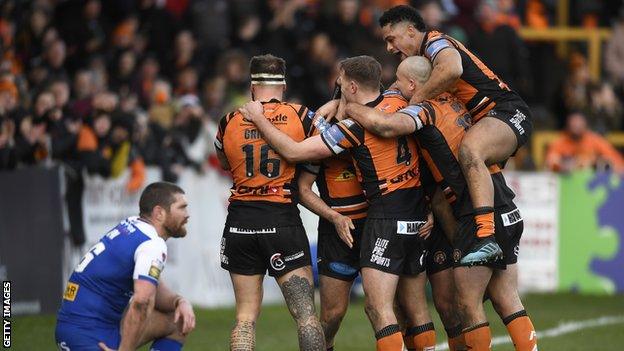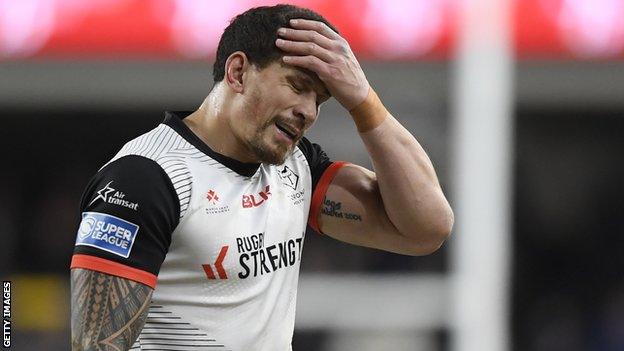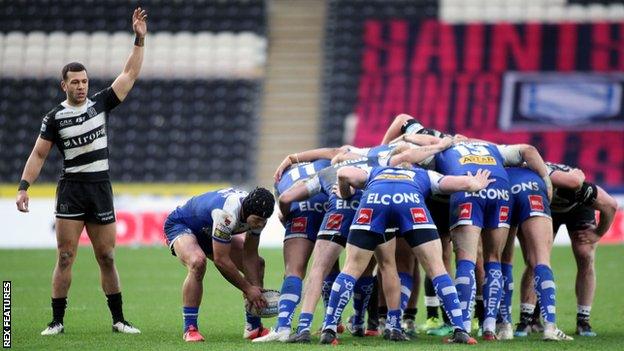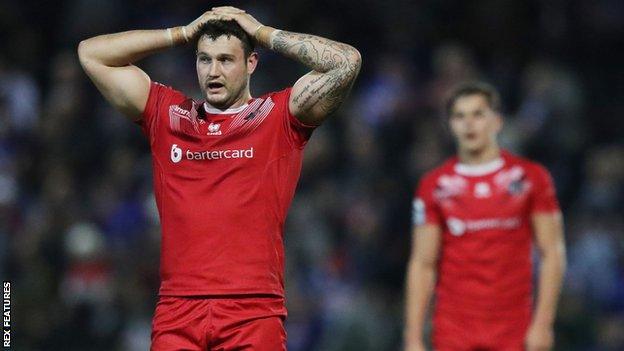Super League: What has changed as rugby league prepares to return?
- Published

Castleford were convincing winners over St Helens before the Super League season was suspended
When the season was suspended because of coronavirus on 15 March, after Castleford's 28-14 win over St Helens, the Super League campaign was intriguingly poised.
Saints, last year's champions but now under new coach Kristian Woolf, had lost half of their opening fixtures.
Leeds were smashed by Hull on the opening day of the new campaign, but then strung together four back-to-back wins to suggest they are back in the race for silverware after a couple of lean years.
Wigan and Castleford were showing good early form. And Huddersfield were probably causing the biggest stir, a heavy home defeat by Wigan their only blot on an otherwise eye-catching start with playmaker Aiden Sezer making an early bid for 'signing of the year'.
Hull FC had also sacked two-times Challenge Cup-winning coach Lee Radford just days before lockdown.
But the season had hardly settled into any telling or set patterns, and when it restarts there will be a real scramble to get off the new starting grid as quickly as possible.
The newly-structured competition means the race is on to make the top four at the end of the regular campaign to stand a chance of playing in November's Grand Final.
As it stands, there are only six points between joint-leaders Wigan, Castleford and Huddersfield and bottom club Hull Kingston Rovers.
And, while Hull have played seven games, Leeds and Catalans have only played four and everyone else has played either five or six fixtures.
So it is all up for grabs and it will be a few weeks before the obvious runners and riders become clear.
What's happened to Toronto?

Not even the presence of Sonny Bill Williams could prevent Toronto losing all six of their Super League games
Toronto Wolfpack made big noises when they arrived in Super League at the start of the season, not least with the signing of world superstar Sonny Bill Williams.
The first-ever transatlantic side in British sport was clearly set on making many more headlines. But they have been of the wrong kind.
They lost their opening six Super League matches - all played in England - had begun to accumulate a worrying number of injuries and looked on course for a relegation battle.
Their possible salvation came from the fact that still had to enjoy home advantage back in Canada in front of promised big crowds.
But Covid-19 has done for them - for this year, anyway.
In pulling out of the 2020 campaign they have cited financial problems that no other Super League club has had to face.
Unable to furlough players, unable to access the £16m government loan given to the British game, unable to take a share of the central TV funding, and unable to draw much more from owner David Argyle's dwindling liquid assets, they decided they were unable to carry on for the time being and have been mothballed.
Whether they come straight back into Super League next year, or are forced to drop down into the Championship or even League One, has still to be decided. But the noises from the club are that they will be back, in one form or another.
What about the rule changes?

There will be no scrums when Super League resumes on Sunday
Oh yes, some significant rule changes.
For the time being scrums have been axed. It is part of trying to make the playing environment as safe as possible and reduce the risk of any potential spread of the Covid-19 virus.
But removing scrums will change the dynamic of the game. No longer will six players from each side congregate for a few seconds in close proximity and give rise to a different potential for attack for the side winning the ball.
Instead, it will be a tap restart for the team that would have had the feed - although there will be a few seconds' delay, signified by in-stadium shot-clocks, before they are allowed to tap and go.
How that plays out remains to be seen. Will the sport look a little two dimensional as a result? And if it is judged to be a positive change, might it lead to the push for a demise of scrums altogether?
The other significant change is the so-called 'six again' rule, which was introduced in Australia's National Rugby League when they started after lockdown mid-season as pressure grew to make the game more entertaining.
Under the 'six again' rule, any offence in the tackle other than foul play - such as lying on in the tackle or interfering at the play-the-ball - would lead to the referee resetting the six tackle count back to zero, rather than giving a penalty.
In Australia the rule has been widely acclaimed as a success, making the game quicker, helping tire out some of the bigger players and opening up more possibilities for dummy-half runners and game-breakers.
Again it will be interesting to see how the rule plays out here. Will it lead to some big blow outs? Will teams with quick dummy-halves simply milk the advantage with some metronomic charges out from behind the ruck? Or will we see the skilful sixes and sevens given more chance to stamp their class on games with the ball moving wider earlier?
There is a Covid-19 element to introducing the 'six again' rule because it theoretically leads to less contact time in the tackle. But it's the expectation of extra fun that it possibly brings to the game that is behind it being introduced so soon.
What about relegation?

London Broncos were relegated from Super League on the final night of last season after losing at Wakefield
No-one will be relegated this year, and that could be a great relief to a clutch of clubs who may find themselves in danger of finishing bottom in a potentially tight table come the end of the season.
The Super League clubs lobbied for relegation to be voided in 2020, given the disruption to the fixture list and the imbalance created by having to play at least some matches at neutral venues behind closed doors.
The Rugby Football League agreed and, given that the Championship will not be returning in a recognisable form this year, has also said there will be no promotion either.
So clubs can now play without any pressure. That might give coaches of clubs near the bottom the chance to blood a few younger players. With the tensions of livelihoods-at-stake being lifted we may see some more entertaining, free-flowing games.
There will be those that will miss the cut and thrust of the annual relegation dog-fights. But I think we can forgive the owners, coaches and players for lacking the appetite to fight for survival, when a more existential fight for survival has been going on since March.
It has been a long lay-off, a shorter than normal pre-season for players to prepare for the 'new' campaign and there will be a fear of an increased number of injuries as a result, especially given how crowded the fixture list begins to look by September and October.
But, for the moment, there is just a game-wide relief that Super League is back.
Everyone will be hoping that the fans will be back as well before long.
